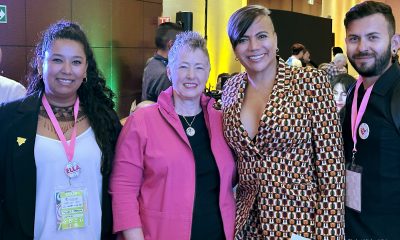Miscellaneous
Anti-LGBTQ+ candidates win Paraguay elections
Country’s president-elect is member of ruling Colorado Party
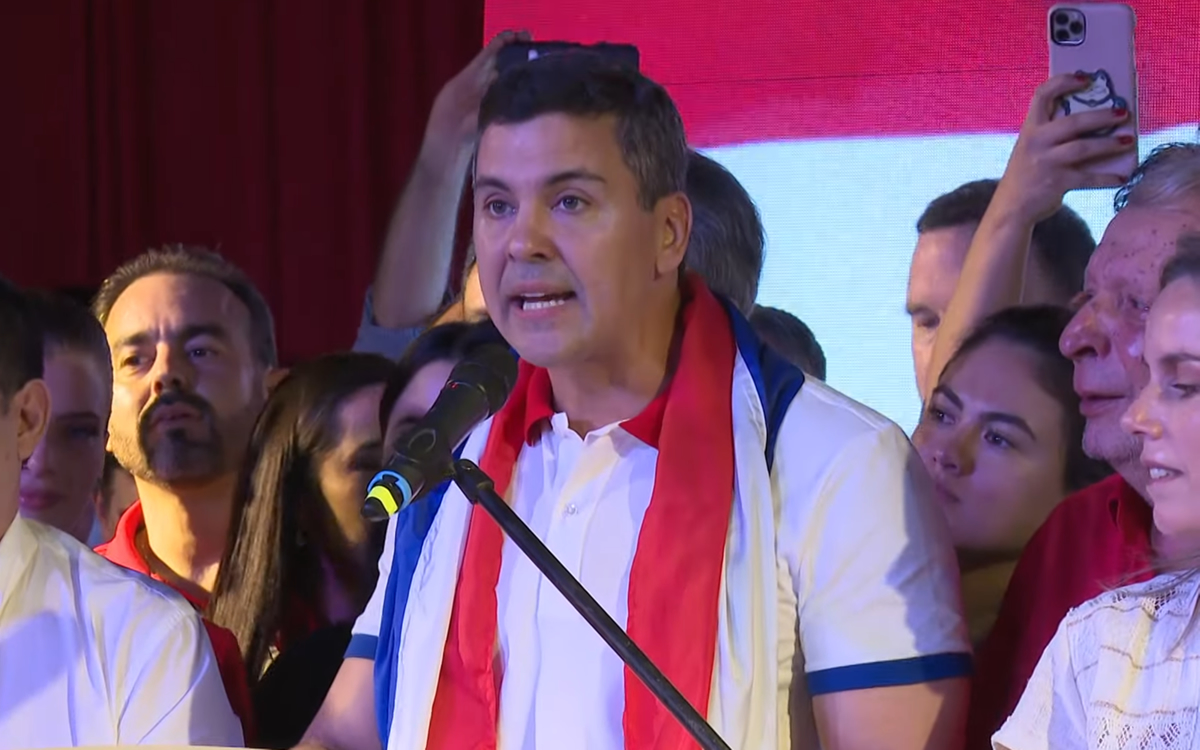
ASUNCIÓN, Paraguay — Paraguay’s presidential and congressional elections took place on April 30.
No openly queer candidates ran in the elections, while the presidential hopefuls did not put forth proposals in favor of LGBTQ+ and intersex Paraguayans. Anti-LGBTQ+ leaders, however, during the campaign managed to deepen discrimination based on sexual orientation and gender identity through hate speech in public debates.
Paraguay is one of the Latin American countries without any public policy or legislation that protects queer rights.
Current President Mario Abdo’s Colorado Party will remain in power after President-elect Santiago Peña won the presidential election.
“There is not much surprise in how the Colorados operated, nor is it surprising that people’s discontent seeks an outlet in more extreme candidacies,” Gabriel Grommeck of SomosGay, a Paraguayan LGBTQ+ and intersex rights group, told the Washington Blade after the election results became known.
Grommeck pointed to the “American syndrome of extreme positions based on disinformation, which, when agitated by the media and social networks managed by corporations, are transformed into successful candidacies.”
“It is very present here,” said Grommeck.
The Foreign Affairs Ministry last November issued a circular to all of its branches that contained a “glossary” of recommended terms to used in discussions and negotiations on gender issues. The document said these terms are not “universally accepted” and “could collide with legal regulations of our country.”
The prohibited terms are:
• “Women and girls in all their diversity”
• “Diversity”
• “Intersectionality”
• “Sexual and reproductive rights”
• “Full autonomy”
“The government interprets the concept ‘gender’ as referring to the male and female sexes, and with that scope it has been incorporated into national documents,” reads the circular. “Its objective was to ‘instruct’ diplomats not to use ‘ambiguous’ or ‘undefined’ terminology.
Grommeck told the Blade the Colorado Party’s victory amounts to a defeat for the country’s LGBTQ+ and intersex rights movement, which will have for four more years a government that has deepened inequity for queer people in the South American country. Grommeck also said the Paraguayan Congress has little interest in increased inclusion.
“We don’t see much opportunity,” said Grommeck. “The makeup of the Parliament makes it very difficult to make any progress in the next legislature.”
Openly gay U.S. Ambassador to Paraguay Marc Ostfield on April 30 congratulated Peña after his election.
“We congratulate the Paraguayan people and President-elect Santiago Peña for another day of civil participation,” tweeted Ostfield. “We will continue to work together to strengthen our excellent bilateral relations and promoting transparency and an inclusive democracy.”
Felicitamos al pueblo paraguayo por otra jornada cívica participativa y al presidente electo @SantiPenap. Seguiremos trabajando juntos en el fortalecimiento de nuestras excelentes relaciones bilaterales y promoviendo la transparencia y una democracia inclusiva.
— Marc Ostfield (él/he) (@USAmbPY) May 1, 2023
Los Angeles
UCLA’s long-standing LGBTQ+ alumni organization welcomes new president
The Blade sat down with paralegal studies professor and local advocate Bobby Rimas to talk about intersectional leadership and his goals for the UCLA Lambda Alumni Association.

As a young student studying history at UCLA, Bobby Rimas was grounded by his growing desire to give back to his community. He worked as a tutor for low-income students and became invested in learning about the ways intersectionality impacts people’s access to education and resources. “My barriers may not be the same as yours, and your barriers may not be the same as mine,” Rimas told the Blade. “How do you apply that in leadership [and] in the classroom?”
After 15 years of service to UCLA’s various alumni networks, first beginning with the Pilipino Alumni Association, Rimas became president of the university’s Lambda Alumni Association on Jan. 1. The UCLA Lambda Alumni Association was formed in 1989 as a way to support LGBTQ+ students and graduates with professional development, scholarship opportunities, mentorship, and other outreach support.
UCLA has long been a local epicenter of queer activism and advancement. Students formed groups like the Gay Student Union and Lesbian Sisterhood in 1969 and 1973, respectively, to empower and connect queer students. Queer art and culture also thrived in this time, as students saw the launches of the queer campus paper, magazine, and a film festival that centered on LGBTQ+ stories.
Administratively, campus officials were taking a stance against LGBTQ+ discrimination. In 1975, UCLA Chancellor Charles E. Young banned departments and programs from discriminating on the basis of sexual orientation.
In the decades since, leaders like Rimas are working to preserve this history and also build upon it. How can we inspire students in and out of the classroom? How do we make sure they have access to valuable resources and can advocate for themselves in places that are not always inclusive of their needs and identities?
Rimas often ponders these questions, both as president of the Lambda Alumni Association and at Cal State LA, where he works as an associate professor of paralegal studies. There is often cross-pollination in the concerns he receives from alumni members as well as his students: How do they find employers who are accepting of LGBTQ+ people? How do they avoid being discriminated against in the workplace?
These are questions Rimas hopes to tackle more in his role as president of the UCLA Lambda Alumni Association and in his continued tenure as an educator. One of his first goals is to expand the board and bring on more diverse perspectives to the organization. “More people means more activity,” Rimas said, who hopes that the combined knowledge and resources of the board can better serve students and alumni.
Rimas also hopes to throw a large Gala event, one that mirrors the extravagant, celebratory 2019 bash he organized for the association when he was first brought onto the team. 100 people attended, creating a wave of awareness for the organization and increasing their scholarship funding.
What’s next? UCLA Lambda Alumni Association’s first board meeting is this upcoming Monday. Rimas hopes to discuss strategies to grow the organization’s presence beyond the campus’ reach, in other queer cornerstones like West Hollywood, elevating diverse LGBTQ+ voices, and improving ways they can professionally support their network’s members.
Kristie Song is a California Local News Fellow placed with the Los Angeles Blade. The California Local News Fellowship is a state-funded initiative to support and strengthen local news reporting. Learn more about it at fellowships.journalism.berkeley.edu/cafellows.
Los Angeles
Advocates demand that trans youth be protected as cases are argued in Supreme Court
This week, LGBTQ+ advocates and legal experts spoke in support of trans youth as two Supreme Court cases challenge their rights and safety.

This Tuesday, the Supreme Court heard oral arguments regarding two cases about transgender girls in sports: Little v. Hecox and West Virginia v. B.P.J.
In 2020, Idaho Governor Brad Little signed into law HB 500, which bans transgender girls and women from participating in school sports. This affected the first case’s respondent: transgender student athlete Lindsay Hecox, who was barred from participating in the track and cross country teams as well as intramural soccer and running clubs.
In 2021, then-governor of West Virginia, Jim Justice, approved HB 3293, which enacts a similar ban. Becky Pepper-Jackson (B.P.J.), now an incoming high school student, opposed the discriminatory policy when it prevented her from joining her then-middle school’s cross country and track and field teams. Pepper-Jackson has also only undergone female puberty due to gender-affirming care, but West Virginia argues that its anti-transgender policies should be upheld because of her assigned sex at birth.
For LGBTQ+ advocates and allies, these cases illustrate the burden and harm transgender people face daily as their rights to privacy, dignity, care, and inclusion are constantly at risk of being eroded and stripped completely.
Experts also wonder if these cases could potentially reshape the Constitution’s Equal Protection Clause as well as the civil rights law, Title IX. The former prohibits discrimination on other factors aside from race, though governments have argued that certain “suspect classifications” can be looked at more closely through “heightened scrutiny.” The latter prohibits sex-based discrimination in federally-funded schools.
What is unfolding and how local advocates are informing change:
The fight ahead is weary, and experts are certain that the states involved will not concede their points. In a webinar organized yesterday by the Williams Institute, several LGBTQ+ policy experts, including Rutgers Law School professor and anti-discrimination scholar Katie Eyer, examined where these cases may be heading, as well as efforts to muddy the arguments.
“It seems possible that the court might try to sidestep that issue here by saying that these laws don’t target transgender people at all,” Eyer said. “I think for most people, this seems bananas: like an upside-down world. We all know these laws were about transgender people.”
Jenny Pizer, an attorney for the LGBTQ+ civil rights legal organization Lambda Legal and a co-counsel member for the B.P.J. case, affirmed this sentiment at a press conference organized Tuesday by Lambda Legal and AIDS Healthcare Foundation affinity group, FLUX. “They’ve gone to great lengths to say there’s no discrimination,” Pizer said. “[They’re arguing] it’s just technicalities or classifications.”
Eyer was one of three Equal Protections scholars who filed an amicus brief to be considered in the Supreme Court cases. An amicus brief is a legal document submitted by someone who is not involved directly in a case but who may offer additional perspectives and information that can inform the ruling process.
Eyer’s brief provided historical context that clarified the disadvantages of blanket sex-based policies. These types of laws, according to Eyer, uphold stereotypes over nuance, truth, and equal protection guidelines. For Pepper-Jackson, who has only undergone female puberty and who does not “benefit” from what dissidents define as a sex-based competitive “advantage,” the state should have provided her the ability to argue that she should have the same rights as other girls.
“Of course, the state hasn’t done that here,” Eyer said. “Under these precedents, the Supreme Court should invalidate the laws as applied to those trans girls who really don’t have a sex-based competitive advantage.”
Who are these bills protecting?
The states argue that their policies are merely “ensuring safety and fairness in girls’ sports.” But queer advocates understand that this is a veneer for the exclusion of transgender people from society. Forcing trans youth out of sports “does not protect anyone,” according to California LGBTQ Health and Human Services Network director Dannie Ceseňa, who spoke at Tuesday’s press conference.
“It encourages the scrutiny of children’s bodies. It fuels gender policing, and it creates hostile school environments — not safer ones,” said Ceseňa. “Our youth should not inherit a world that treats their existence as a threat.”
Transgender people are systemically disempowered
At yesterday’s webinar, Distinguished Visiting Scholar at the Williams Institute Andrew Flores discussed his own amicus brief in support of Pepper-Jackson. The brief highlights the need for “heightened judicial scrutiny” in Pepper-Jackson’s case because the majority of political processes “systemically fail” transgender people.
For example, the transgender community faces substantial barriers in exercising their voter rights because of voter identification laws and other policies that regulate and define identity. “Even being able to gain access to the franchise is a burden for transgender people,” Flores said. “The court does play an important role there. It can grant legitimacy to arguments…or at least [acknowledge] that these issues are more complicated than maybe how they’ll receive them.”
What’s next?
Experts are hesitant about where the cases stand. “Bottom line: I don’t know what the court is going to do in these cases. They may send them back down for further development,” Pizer said, who thinks future rulings will not shift more overarching policies regarding transgender rights. “I think they will probably decide based only on laws about sports, not laws more broadly about the rights of trans folks.”
But whatever is decided, the impacts will trickle down to everyone. While the cases deal specifically with anti-transgender policies, experts warn that LGBTQ+ issues have always been tied to racial, economic, and disability justice. “There’s this looming constitutional campaign to really undermine civil rights,” said Eyer. “That affects LGBTQ people. It affects people of color. It affects people with disabilities. It affects everybody, and it really is concerning.”
As transgender inclusion and safety are being argued on the largest legal stage, advocates are asking: “When are you going to step up?” They are also sending a direct message to transgender youth: “We see you, we believe in you, and we are fighting for you,” said Ceseňa. “You deserve joy, community, and care. You deserve a future that reflects who you are and not who anyone or any politician demands you to be. Trans youth deserve better.”
Kristie Song is a California Local News Fellow placed with the Los Angeles Blade. The California Local News Fellowship is a state-funded initiative to support and strengthen local news reporting. Learn more about it at fellowships.journalism.berkeley.edu/cafellows.
LGBTQ+ Youth Mental Health
Law expanding mental health resources for LGBTQ+ youth has gone under effect
Beginning Jan. 1, AB 727 amplifies resources for queer students in California.
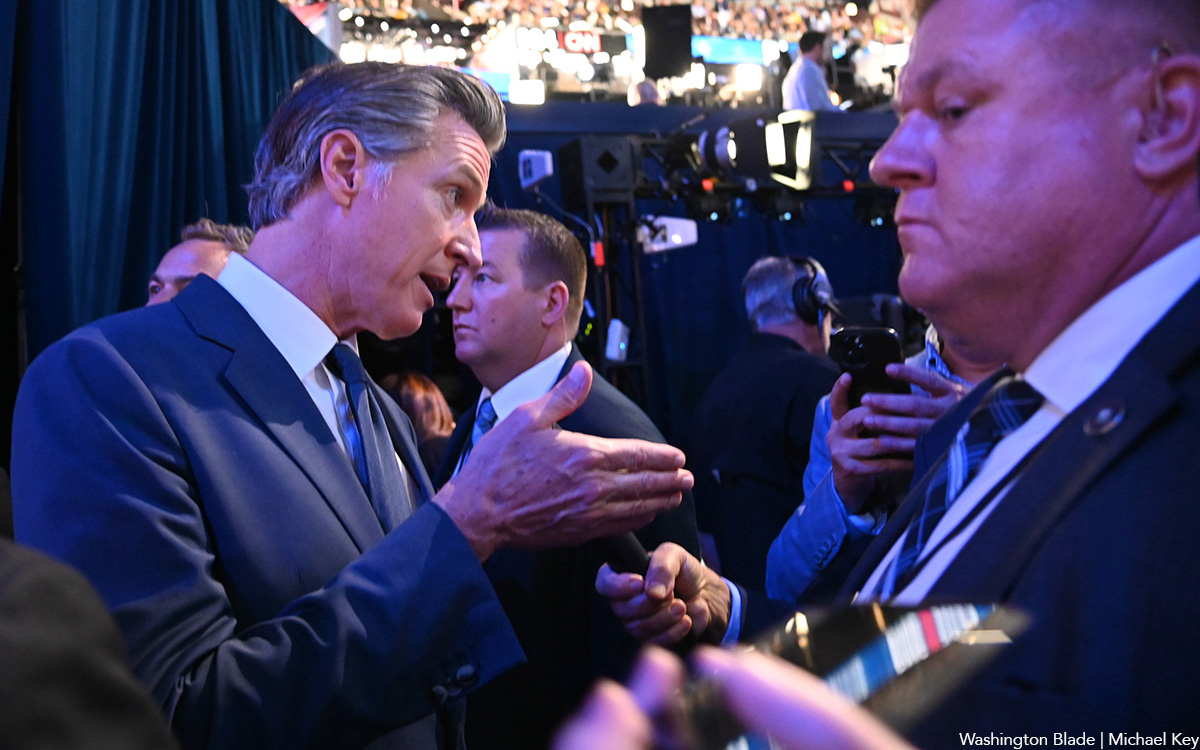
On Wednesday, Governor Newsom announced in a press release that a number of key statewide laws would take effect on New Year’s Day. One of these laws is AB 727, a bill that mandates that all student ID cards in California’s public middle schools, high schools, and colleges include the number for the LGBTQ+ suicide prevention nonprofit The Trevor Project’s 24/7 crisis hotline.
Authored by local Assemblymember Mark González, the bill is especially crucial as President Trump steers administrative efforts that seek to end various LGBTQ+ resources. In 2025, the national 988 Suicide and Crisis Lifeline discontinued its “Press 3 option,” which connected young queer people to a specialized counseling line.
Hate crimes targeting transgender, gender nonconforming, and other queer folks are on the rise in California. Amongst LGBTQ+ youth, mental health concerns are increasing. The Trevor Project found in a recent study that suicidal ideation amongst young LGBTQ+ people living in the U.S. rose from 41% to 47% in the last two years.
In December, the administration began advancing proposals that would ban gender-affirming care for minors, as well as restrict insurance coverage around these essential services. News updates like these have become frequent and incessant, creating an echo chamber that more and more young queer folks are struggling to escape from.
AB 727 is trying to remind them that they are not alone. “Every student deserves to feel safe, supported, and seen for who they are,” wrote Governor Newsom in October, when he first signed the bill. “AB 727 makes it clear: your identity doesn’t disqualify you from care and community – it’s exactly why we are fighting to make it easier to reach.”
The bill is one of a number of statewide and local efforts to ensure young queer people are able to readily access empowering resources, education, and someone who is eager to listen to and support them. For many queer folks, this small act can be life-altering, even life-saving. Other initiatives include a motion by Los Angeles Supervisors Lindsey Horvath and Janice Hahn that proposes a localized version of the “Press 3 option.”
“We’re sending a clear message,” wrote Assemblymember González, after AB 727’s initial signing in October. “[That] our LGBTQ+ youth are seen, valued, and never alone. AB 727 is not just a piece of legislation; it is a lifeline for our queer youth.”
Kristie Song is a California Local News Fellow placed with the Los Angeles Blade. The California Local News Fellowship is a state-funded initiative to support and strengthen local news reporting. Learn more about it at fellowships.journalism.berkeley.edu/cafellows.
Los Angeles
Anger, resistance and unity coursed through L.A. City Hall “No Kings” protest
The Blade photographed Saturday’s demonstration as thousands mobilized and marched
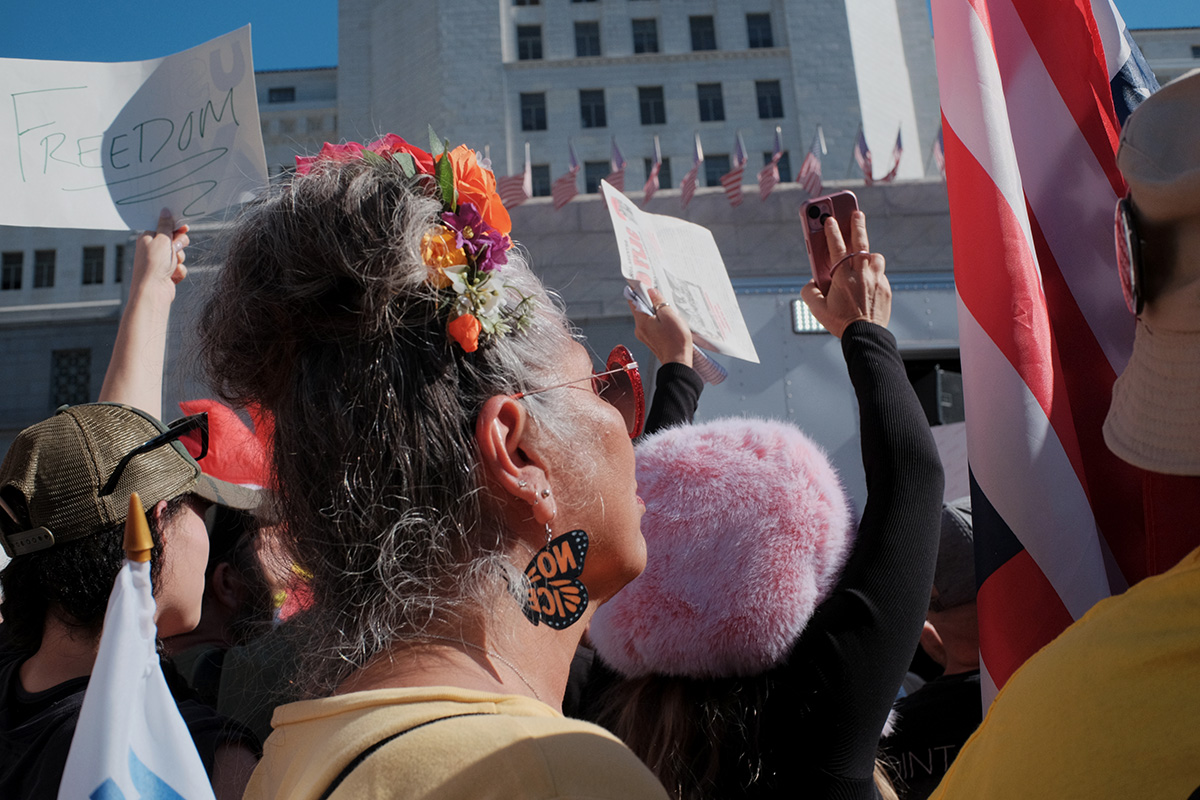
On Oct. 18th, a mosaic of Angelinos across generations and cultural backgrounds gathered outside of city hall as they proudly lifted handmade signs decrying President Trump and the current administration. This march was one of several rallies organized just within the city, and one of thousands others organized across the nation.
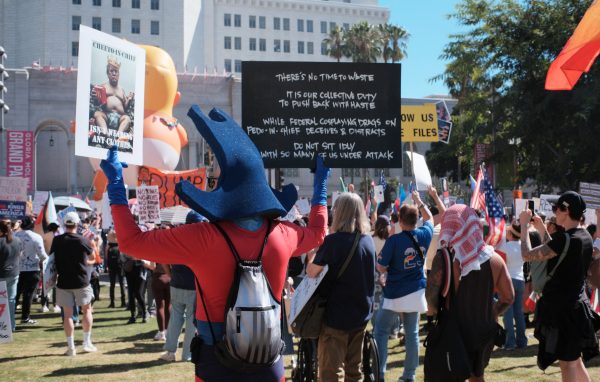
The protest was packed, with people standing nearly shoulder to shoulder as a number of local leaders including Black Women for Wellness Action Project policy analyst LaKisha Camese, TransLatin@ Coalition president Bamby Salcedo and Assemblymember Isaac Bryan, made rousing speeches and led passionate chants before the march began. Speakers like political commentator Brian Tyler Cohen did not hold back when they addressed the crowd. “[They are] so desperate to rebrand this thing as a ‘Hate America’ rally. But do you know what hating America looks like?,” asked Cohen.
Image captures by Blade reporter Kristie Song
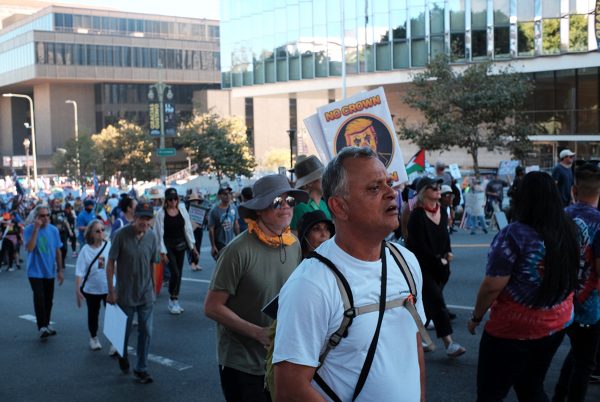
“It looks like sending secret police accountable to no one into our cities…It looks like keeping the government closed because you are so hell bent on stripping away health care from 24 million Americans and trying to get their costs to double, triple or quadruple. So if you’re looking for the ‘Hate America’ rally, might I suggest the White House.”
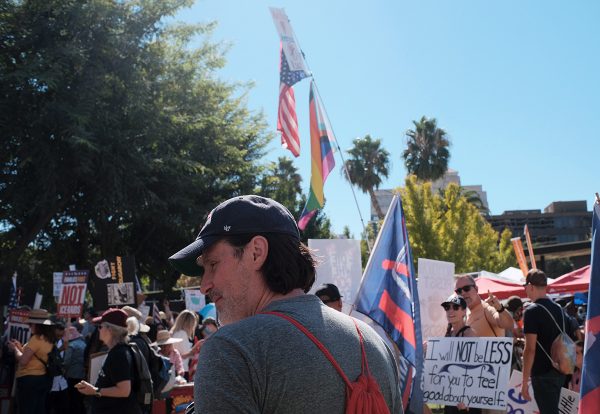
Protestors cheered at the top of their lungs with each passing speech, and each clear and explicit denouncement of the current administration. “There’s no rally like what’s happening here in Los Angeles,” said Assemblymember Bryan. “This is where Black, brown, poor, indigenous, everyday people come together…Washington D.C. doesn’t care about us, and we know that. But, we care about each other, don’t we? We believe that health care is a human right, don’t we? We believe that housing is a human right, don’t we? We will stand up to authoritarianism, won’t we? Because when we fight together, what happens? We win!”
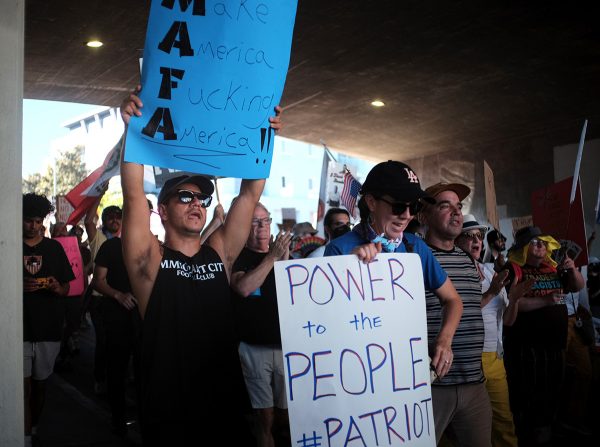
As people began to grow restless, the march finally began, taking them to a highway overpass.
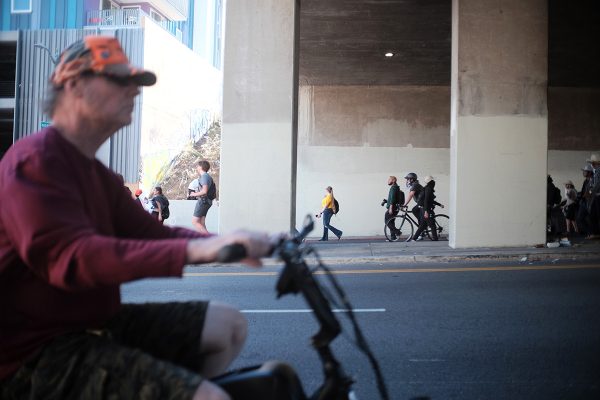
As residents boarded a bus at Cesar E. Chavez and Broadway, they were halted by blocked roads as large congregations marched by. Transit riders looked on into the crowds, their faces mere inches from some of the passing protestors. Separated by a layer of window glass, one nodded along as protestors lifted their signs above their heads and chanted “ICE out of LA!” Some waved to people inside the stalled bus, inviting solidarity from those who weren’t marching alongside them.
When the road cleared, their calls could still be heard for a little longer.
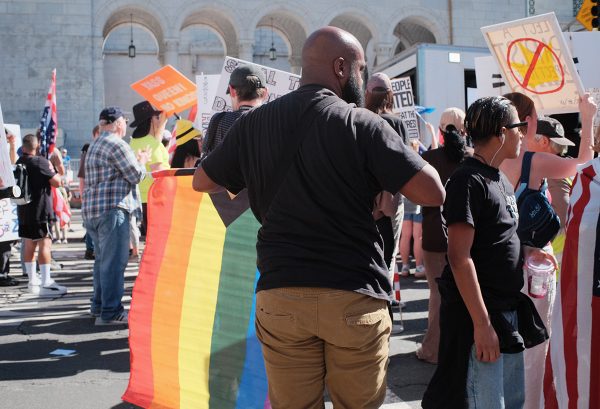
California
Governor Newsom has vetoed two bills aimed to improve PrEP and gender-affirming care access
An update on AB 554 and SB 418, as well as nine other LGBTQ+ bills that the governor passed earlier this week

This Monday, Governor Newsom issued a legislative update on over 150 bills that had passed legislation and were waiting on his decision on whether or not they would be chaptered into law. 11 of these bills advocated for queer community members, including their improved access to healthcare, more privacy rights, greater ease in changing their name and gender markers, as well as the expansion of adoption rights and the inclusion of two-spirit individuals into important funding and resource opportunities.
Two were vetoed.
AB 554: Greater access to HIV/AIDS preventative medicine (Vetoed)
First introduced in February, AB 554 was co-authored by local Assemblymember Mark González and San Francisco Assemblymember Matt Haney. Also known as the Protecting Rights, Expanding Prevention, and Advancing Reimbursement for Equity (PrEPARE) Act of 2025, the bill intended to expand patients’ access to various forms of FDA-approved HIV/AIDS preventative medication. It would have prohibited health insurance plans from subjecting these forms of medication to prior authorization, step therapy, or cost-sharing. It would have also required the state to reimburse local agencies for administering this medicine, alleviating the strain on small clinics to meet the demand of community members in need of PrEP.
Though LGBTQ+ civil rights groups like Equality California rallied support for the bill, it was returned by the governor without a signature. In a veto memo, he wrote that he “wholeheartedly [supports] efforts to ensure affordable and accessible prevention and treatment of HIV/AIDS” but questioned whether the bill would actually increase the affordability of and access to necessary preventative treatment. “By exceeding the cost-sharing provisions under the ACA [Affordable Care Act], this bill would result in increased costs to health plans, which would then be passed on to consumers.”
In response, Assemblymember González wrote to the Blade about his disappointment. Still, he remains hopeful about the state of PrEP access. “I’m deeply grateful to Governor Newsom for his continued partnership and for standing with us in protecting access to PrEP through this year’s budget.”
SB 418: Stronger access to gender-affirming care without discrimination (Vetoed)
Authored by Senator Caroline Menjivar, SB 418 would have required a health care service plan to cover up to a 12-month supply of FDA-approved prescription hormone therapy and the supplies needed by an individual to self-administer this medication without being subjected to utilization management methods like prior authorization.
The bill was also intended to prohibit health insurers from denying a patient the ability to enroll in or renew their health insurance plans based on factors like sex characteristics, intersex traits, and gender identity.
In late January, President Trump released a statement that the federal government would “not fund, sponsor, promote, assist, or support the so-called ‘transition’ of a child from one sex to another.” As healthcare for trans, gender-expansive, and intersex (TGI) individuals becomes increasingly unstable under the current administration, SB 418 aimed to protect TGI community members and their ability to access critical and necessary hormone therapy and gender-affirming care.
In the governor’s veto memo, he wrote that he was “concerned” about the bill’s limitation on utilization management methods. For him, it’s an “important tool [that ensured] enrollees receive the right care at the right time. Prohibiting this cost constraint strategy is likely to result in an increase in enrollee premiums to offset costs incurred by health plans and insurers.”
For Senator Menjivar, this decision was “heartbreaking” as TGI individuals continue to face barriers to vital care. “SB 418 was the most tangible and effective legislative tool introduced this year to help TGI folks weather this political storm,” Menjivar wrote to the Blade. Still, she says that she is committed to continue fighting to secure health care access for TGI community members.
The vetoing of these two bills was a major blow for LGBTQ+ civil rights organizations and advocates. Equality California executive director Tony Hoang wrote about his disappointment in a recent press release. “These bills would have guaranteed that transgender people and their families could continue to access essential medications without disruption and that people at risk of HIV could obtain PrEP quickly and affordably,” wrote Hoang. “The Governor’s decision to veto these measures undermines California’s longstanding leadership in advancing health equity and protecting the LGBTQ+ community.”
But with these setbacks came a number of wins. Governor Newsom passed nine other bills advancing the rights of LGBTQ+ individuals.
SB 59: Confidentiality protections for trans and nonbinary individuals
This bill, authored by Senator Scott Wiener, will ensure that when someone files a legal petition to change their name or their gender marker, these court records are kept confidential. Additionally, SB 59 will prohibit people other than the petitioner to post these confidential records online.
AB 678: Creating an LGBTQ+ inclusive council on homelessness
Created by Assemblymember Alex Lee, AB 678 will require the governor to build an Interagency Council on Homelessness that will form relationships between federal and state agencies with local, on-the-ground coalitions and nonprofit organizations that focus on working with unhoused communities. Together, they will work on creating strategies to end homelessness.
The bill also specifically requires this council to actively work with LGBTQ+ leaders and community members to ensure that the strategies it develops are inclusive and culturally competent.
AB 1525: Restricting disciplinary action against attorneys on the basis of “sensitive services,” which includes gender-affirming care
The California State Assembly’s Committee on Judiciary created this bill to prohibit disciplinary action against attorneys who receive, advocate for, recommend, or enable “sensitive services,” which include health care services for sexual and reproductive health, sexually transmitted illnesses, and gender-affirming care.
AB 1084: Streamlining court processes for name and gender marker changes
Created by Assemblymember Rick Zbur, AB 1084 aims to quicken the process and limit barriers transgender and nonbinary individuals face when filing to change their name and gender marker. The bill will require courts to issue orders within six weeks from when a petition is filed, and without a hearing. The bill will also prohibit others from being able to file an objection to a petitioner’s name or gender marker change.
SB 450: Protecting adoption rights for LGBTQ+ parents and families
Authored by Senator Menjivar, SB 450 will allow queer parents from other states to claim parentage rights to their adopted children born in California. “The signing of SB 450 is a win for LGBTQ+ parents who want what every parent wants, the protection of their legal rights as the parents of their children,” Senator Menjivar wrote to the Blade. “SB 450 clarifies California’s longstanding jurisdiction for adoption proceedings, including confirmatory adoptions, in cases where the families no longer live, or never lived, in the state but the child was born here. This means LGBTQ+ families, who are weighing the options of potentially leaving an affirming state to a Red state for financial reasons, can at least now feel confident that decision won’t cost them their parental rights.”
SB 497: Protecting right to gender-affirming care from out-of-state law enforcement
Authored by Senator Wiener, SB 497 is another bill focused on providing protections for transgender and nonbinary individuals. It will prohibit healthcare providers and service plans from releasing medical information related to gender-affirming care for a patient who is being pursued by out-of-state law enforcement officials. SB 497 would also generally safeguard against out-of-state subpoenas that would prevent a person’s ability to access gender-affirming care.
SB 590: Including chosen family members in paid family leave laws
Authored by Senator Maria Durazo, this bill would alter existing laws around paid family leave, which currently provides wage replacement benefits for up to eight weeks for workers who take time off work to take care of seriously ill family members. SB 590 will expand this definition of family members to include “designated” persons. For many queer individuals, their “chosen family” members are often just as crucial, if not more than, their blood relatives. This bill opens up the scope of what is considered a family member, allowing LGBTQ+ individuals wage protections if they take time away to care for these loved ones.
AB 1487: Expanding equity fund to include two-spirit communities
Co-authored by Assemblymembers Dawn Addis and Mark González, AB 1487 will rename the existing Transgender, Gender Nonconforming, and Intersex Wellness and Equity Fund to the Two-Spirit, Transgender, Gender Nonconforming, and Intersex (2TGI) Wellness and Equity Fund. This will enable the fund to grant financial support to organizations that serve two-spirit and LGBTQ+ tribal community members in a number of services, including: workforce development training, resettlement and social integration programs, youth outreach, healthcare support, and more.
AB 82: Confidentiality protections for patients and providers of reproductive and gender-affirming care
Authored by Assemblymember Chris Ward, this bill will allow reproductive or gender-affirming health care patients and service providers who face violence and harassment because of their association with such care to request that state and local agencies protect the confidentiality of their identities and addresses.
Miscellaneous
Escaping the party culture: Why more LGBTQ+ people are choosing sobriety and utilizing ketamine therapy
Today, a new wave of healing is taking root—one that blends cutting-edge science with compassionate care.

Introduction: From Glitter to Grounding
West Hollywood has long been a symbol of queer resilience, joy, and liberation. But beneath the rainbow lights and endless champagne toasts lies a quieter truth: many LGBTQ+ individuals are struggling with depression, alcohol dependency, and anxiety. The party culture that once felt like freedom can slowly turn into a trap.
Today, a new wave of healing is taking root—one that blends cutting-edge science with compassionate care. Instead of another night numbing pain at the bar, thousands of queer residents are choosing sobriety, finding purpose, and embracing innovative treatments like at-home ketamine therapy and low-dose naltrexone (LDN).
At the heart of this movement is Better U, a mental wellness company disrupting the status quo with discreet, science-backed solutions that bring healing into your home.
The LGBTQ+ Mental Health Crisis: More Than Just Statistics
The numbers are sobering: LGBTQ+ adults are twice as likely as heterosexual adults to experience depression, anxiety, and substance use disorders. In West Hollywood, where nightlife thrives, alcohol often becomes a coping mechanism—until it becomes a chain.
Alcohol use disorder affects up to 25% of LGBTQ+ adults, compared to about 10% of the general population. LGBTQ+ youth are four times more likely to attempt suicide than their peers. Despite these disparities, most treatment options still revolve around daily antidepressants or 12-step programs that don’t address the root causes of pain.
The truth? Traditional mental health care is falling short for queer communities.
Why Daily Pills and Party Culture Aren’t Enough
For decades, the standard treatment for depression and anxiety has been daily antidepressants. But LGBTQ+ patients often report:
• Unwanted side effects (weight gain, sexual dysfunction, emotional numbness).
• Low effectiveness rates (many report little to no relief after years on medication).
• Stigma around seeking help that discourages follow-through.
Add to that the cultural reliance on alcohol as a form of connection, and many people find themselves in a cycle of numb → escape → crash → repeat.
This is where ketamine therapy and LDN step in—not as escapism, but as tools for healing, sobriety, and self-discovery.
The Science of Ketamine Therapy: Rewiring the Brain
Unlike recreational use, ketamine therapy is a safe, low-dose, medically guided treatment that targets the root of depression and addiction.
• Neuroplasticity boost: Ketamine stimulates glutamate receptors, helping neurons form new connections. Think of it as opening “windows of change” where stuck thought patterns can be rewired.
• Rapid results: Unlike antidepressants that can take six to eight weeks, ketamine therapy often reduces depression and suicidal ideation within hours to days.
• Emotional reset: Patients report profound shifts in perspective, allowing them to process trauma without being consumed by it.
For LGBTQ+ patients who’ve lived with rejection, shame, or identity-based trauma, this reset can be life-changing.
Low-Dose Naltrexone (LDN): A Little-Known Ally Against Alcohol
While ketamine works on depression and anxiety, LDN quietly helps tackle alcohol cravings and inflammation.
• How it works: Naltrexone blocks opioid receptors, reducing the rewarding effects of alcohol. Over time, drinking loses its grip.
• In low doses: LDN also calms inflammation in the brain and body, which researchers link to depression, chronic pain, and autoimmune conditions.
• For sobriety: Thousands in recovery use LDN to ease the process of quitting drinking without feeling deprived.
When combined with ketamine therapy, LDN addresses both the emotional and physical roots of addiction.
Better U: Healing at Home, Without the Stigma
Here’s what sets Better U apart in West Hollywood’s crowded wellness landscape:
- At-Home Treatment – No fluorescent clinic lines, no judgmental waiting rooms. Medication is delivered discreetly to your door.
- Remote Accountability Coaching – Licensed integration coaches guide you through your journey, helping you stay accountable while building new habits.
- Holistic Healing – Ketamine therapy, LDN, and psychiatric support are all combined into one seamless program.
- Community Impact – Better U has already helped tens of thousands nationwide, including thousands in West Hollywood, find freedom from alcohol, depression, and anxiety.
“Our mission is to help people come home to themselves—to finally feel at ease in their own skin. To soften the noise of depression, addiction, and anxiety, and replace it with clarity, connection, and love. Every person deserves more than quick fixes or endless prescriptions.
With Better U, we’re offering a path to real healing: the freedom to let go of what no longer serves you and the courage to step into the world as your truest self—living with compassion, spreading love, and inspiring others to do the same.”
Escaping the Party Culture: Stories of Change
Imagine Marco, a 34-year-old gay man living in West Hollywood. For years, weekends meant endless drinking, hookups, and waking up Monday feeling emptier than before. Therapy helped, but not enough. Antidepressants dulled him.
After starting Better U’s at-home ketamine therapy with LDN, Marco noticed:
• His cravings for alcohol decreased.
• His depression lifted in weeks, not months.
• He started running again, something he hadn’t done in years.
• For the first time, he felt hope—not just distraction.
His story is not unique. Across West Hollywood, queer residents are realizing: healing doesn’t have to happen at the bar. It can happen at home.
The Neurobiology of Sobriety: A Closer Look
Why does this approach work so well?
• Ketamine + Glutamate: Increases BDNF (brain-derived neurotrophic factor), helping the brain rewire out of depressive loops.
• LDN + Endorphins: Increases endorphin release in low doses, stabilizing mood while reducing alcohol cravings.
• Alcohol-Free Brain: Within 30 days of sobriety, dopamine receptors begin to recover, improving motivation and joy.
When you pair all three, you’re essentially retraining the brain’s reward system—away from alcohol, toward healthier sources of meaning.
From Isolation to Community
Sobriety can feel lonely, especially in queer spaces where nightlife dominates. But Better U builds community in new ways:
• Integration groups (virtual safe spaces to share experiences).
• Accountability coaching (so you’re never alone in the process).
• Pride in healing (reframing sobriety as strength, not deprivation).
The result? A new queer culture that celebrates authenticity, connection, and healing—not just another round at the bar.
The Bigger Picture: Disrupting a Broken System
The current mental health system is broken. Long waitlists, rushed psychiatry appointments, and overprescription leave too many LGBTQ+ people slipping through the cracks.
Better U’s model challenges that:
• No more waiting weeks for a refill.
• No more hiding your healing.
• No more daily pills without progress.
Instead, queer residents of West Hollywood can access care remotely, discreetly, affordably—and effectively.
Call to Action: A Better U, A Better WeHo
Healing doesn’t have to mean isolation. Sobriety doesn’t have to mean loss. With at-home ketamine therapy and low-dose naltrexone, LGBTQ+ individuals are finding freedom, joy, and purpose again—without leaving their living rooms.
If you’re in West Hollywood and struggling with alcohol, depression, or anxiety, know this: you are not broken. You are not alone. And a better you is possible.
Visit BetterUCare.com to learn more about at-home ketamine therapy, low-dose naltrexone, and how you can begin your journey today.
Kindness is the best medicine.
Miscellaneous
Tiffany ‘New York’ Pollard Dishes on queer storytelling in her new show ‘Slayers: Wheel of Fate’
The reality star discusses her new series and why we always need LGBTQ+ stories

If you’ve watched reality television at all in the past two decades, odds are you’ve been graced by the onscreen presence of Tiffany ‘New York’ Pollard.
Few people have conquered the reality TV landscape like New York; starting off as a contestant on the infamous The Flavor of Love, she went from finding romance to hosting and appearing on some of the best programs this genre has to offer. Queer audiences have always adored their boisterous personality and uncanny ability to verbally eviscerate others—and the feeling is mutual. Whether it’s appearing on RuPaul’s Drag Race, partying it up at gay clubs across the country, or leading her own programs with OUTtv, Pollard has never been shy about showing how much she loves her LGBTQ+ fans. And now, proudly wearing their own LGBTQ+ identity and more committed to queer storytelling than ever, she’s ready to once again revolutionize the medium by hosting OUTtv’s latest competition series: Slayers: Wheel of Fate. The Los Angeles Blade sat down with Pollard to discuss this new reality adventure, what it means to truly support the LGBTQ+ community, and why we always need real stories like these — not just when people are threatening to take them away.
“I’ve always wanted to host a big competition like this,” explained Pollard, on what drew her to Slayers. “Reality TV is in my veins, so I knew I had something special to add to [the show].” It’s a flair that the performer has brought to every project she’s been a part of; from villainous competitions to dating shows centered around her, audiences always enjoy seeing the dynamic authenticity that is Tiffany Pollard. She’s been featured in every kind of reality show imaginable, yet even with such an expansive filmography, she’s never been a part of anything like Slayers.
The series follows a group of LGBTQ+ contestants living together in a mansion and facing a series of brutal competitions, with each episode seeing someone get eliminated through a ‘Main Slay’ challenge. Its contestants span a myriad of gender identities and sexualities, with the series offering them a chance to be their most-real selves. “We need stories that center LGBTQ+ folks…but not just when times are bad,” Pollard explained, on how, while she’s thankful the series focuses on authenticity, similar shows need to similarly let people be themselves, no matter what’s happening in the world around them. “I’ve been around a long time—and I expect to start seeing people stand with us when things are good again, too! Sometimes folks wait until everyone is in danger to give a damn. Support queer people ALWAYS.” It’s an important message now more than ever, and it’s conveyed in the most intense format through Slayers.
Themed around a medieval setting and an illegal ‘dragon-betting’ ring, the players are fighting to unseat the unseen ‘Queen Karen’ in a hilariously campy, shockingly pulse-pounding format. It’s a kind of thrilling fun that so many LGBTQ+ viewers need right now, with the series purposefully spotlighting the identities of its all-queer cast… including the host herself.
In a recent interview with PinkNews, Pollard stated that she ‘resonates with non-binary,’ explaining that her gender identity and expression are very fluid. It’s what made the chance to lead a show of only LGBTQ+ competitors so affirming for her, with the host saying, “As a member of the community with a platform, it’s important to show up and be visible for people. To remind folks they’re not alone.”
Seeing Pollard come out has been a heartwarming experience for her countless fans — and it couldn’t have happened at a better time. While coming out has never been easy, it’s particularly hard for people ‘in the closet’ today; rising anti-LGBTQ+ discrimination nationwide has led to many worrying that accepting their identity openly will label them a political target. Pollard understands this, and it’s why she made sure her competitors felt respected and affirmed at every step of the filming process (when she wasn’t trying to feed them to a dragon, of course). She hopes that her coming out will inspire others to do the same, and she empathizes with those nervous to live their truths today — but assures them that hiding is never the answer.
“I want to remind [everyone scared] that we’re not going anywhere and that we’re stronger as a group,” Pollard said vehemently, imbuing each word with their trademark brand of unflappable confidence. “Put down the petty dramas with each other for right now and let’s just focus on pushing through this.”
It’s slightly ironic to hear a call to unity from New York; most people know her from the many legendary scenes of her tearing others apart (ol’ maiden type of shoes, anyone?). Yet any look at the star’s history will showcase that, while her onscreen career has been built by jaw-dropping chaos, her personal life has always seen her as an advocate, bringing queer folks the joy they need and calling out bigotry across the country.
Tiffany ‘New York’ Pollard hopes that Slayers: Wheel of Fate will not only provide LGBTQ+ viewers a break from the stress of today, but also inspire them to live as passionately free as the people they’re watching onscreen. Throughout the interview, she expressed how she understands why so many are scared, but that finding a safe, affirming way to express one’s pride is more important for our communities than it’s ever been before. She’s grateful for a career that has given her such a big platform to broadcast this message — and detests the way similar stars are rolling back on publicly supporting their LGBTQ+ fans when they need it most.
To these other celebrities, ones who are scared that being anti-hate might lose them some fans, she has one thing to say: “You should be more scared of what happens if you don’t. Period.”
Arts & Entertainment
New exhibition unveils archival records and forgotten stories of HIV/AIDS activists
“The Sky is Always Falling” intertwines past and present cycles of queer crises and fights for freedom
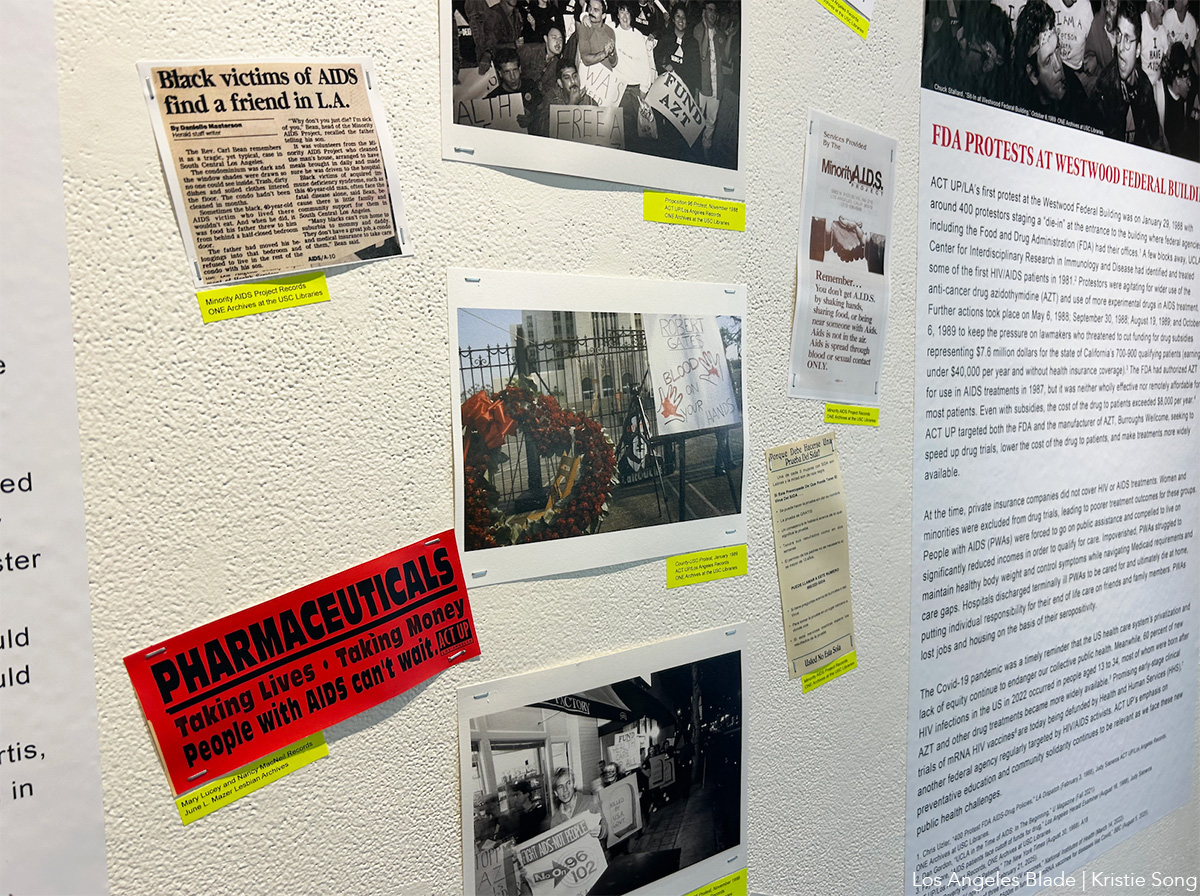
On Wednesday afternoon, art critic and curator Anuradha Vikram strode across the wide main room of the Advocate and Gochis Galleries at the Los Angeles LGBT Center, pressing neon labels onto walls covered with newspaper clippings, pamphlet pages, protest photos and flyer printouts from the peak of the national AIDS epidemic that began in the early 1980s.
These documents hold fragments of the lives of artists, activists and supporters of the AIDS Coalition To Unleash Power/Los Angeles (ACT UP/LA), a group that organized various non-violent protests, community meetings, vigils and other demonstrations to bring attention to harmful and ineffective government policies around HIV/AIDS; advocate for better healthcare access, hospital conditions and resources for PWAs (people with AIDS); and shine light on communities who were sidelined in HIV/AIDS research and care, including women, incarcerated people, and communities of color.
“The Sky is Always Falling: HIV/AIDS Activists Unleashing Power in Los Angeles Then and Now” is a new exhibition opening on September 28th that preserves tangible records of ACT UP/LA’s existence and resistance. Much of the media included in this show is a remnant from when the group was active, from its formation in 1987 to its eventual disintegration in the late 1990s. The various pieces on display are reproductions of historical files and records collected and preserved at institutions like the ONE Archives and the June L. Mazer Lesbian Archives, two major repositories for LGBTQ+ historical materials.
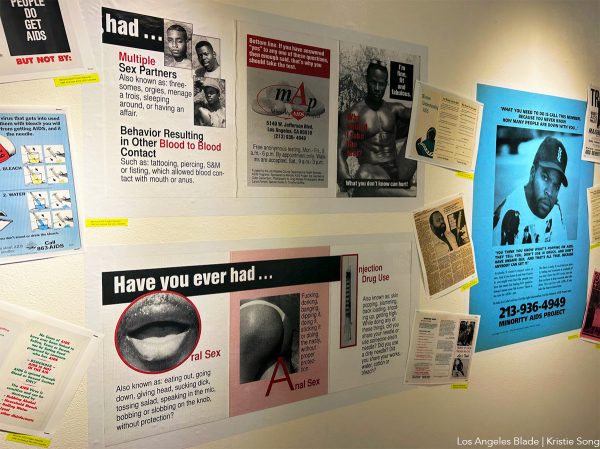
“Since this is primarily focused on the 1980s and ‘90s, so much of the material was printouts, faxes, photocopies, and computer graphic design setups. Reproducing it all made material sense,” Vikram told the Blade.
“If this was a show about the 1940’s or the 1890’s, it might not feel so authentic to have copies of things. But here, even the original materials were copies at one time, so they’re the copies that survived. We’re working with the idea of the copy being the original — which is a very 90’s kind of zine, community-organizing approach that also then applies here for ACT/UP.”
Since April, Vikram has been planning, researching and organizing the exhibition as part of the local Circa: Queer Histories Festival. Now in its third year, Circa was created by One Institute, a long-standing LGBTQ+ organization that amplifies queer histories through educational programming. Their festival runs through October 31st, and includes a panel on the history of sex work in NYC ballroom culture, a South Asian dance and drag performance, a workshop on trans history and reclaiming origin stories, a screening of 1972 Japanese “pink film” Shinjuku Midnight Story: Man and Woman, and several other lectures, readings, and gatherings.
“The Sky is Always Falling” is the opening event of Circa’s packed calendar this year, and offers attendees a chance to become part of an intergenerational conversation around queer solidarity in the face of public health, social, and political crises. The show highlights key actions organized by ACT UP/LA members, including a 1990 protest at Frontera women’s prison that was organized by the coalition’s Women’s Caucus. Over a hundred supporters protested the prison’s handling of its AIDS ward, criticizing its lack of proper nutrition, care, and qualified staff.
In June of 2020, an urgent memo was released by public health experts, stating that San Quentin California State Prison was being impacted by a rapidly developing COVID-19 outbreak and had “profoundly inadequate resources to keep it from developing into a full-blown local epidemic.”
Vikram says it is important to highlight how systemic issues and failures create cycles of violence for marginalized populations. “These issues haven’t gone away in any way. They’ve just kind of rolled forward,” Vikram said. “In each of these topics and panels, the goal was to connect it, ultimately, to something today. So you would understand that it’s not just a historical phenomenon, but rather like a guide, a little bit of a roadmap for how to deal with stuff now.”
A self-proclaimed “baby teenager” during the height of ACT UP activations, Vikram is grateful to the queer elders who welcomed her into their spaces and shared their stories with her. These connections informed her own journey as a queer South Asian person growing up in New York, carving out a space for her own voice and identity in contemporary art criticism and curating.
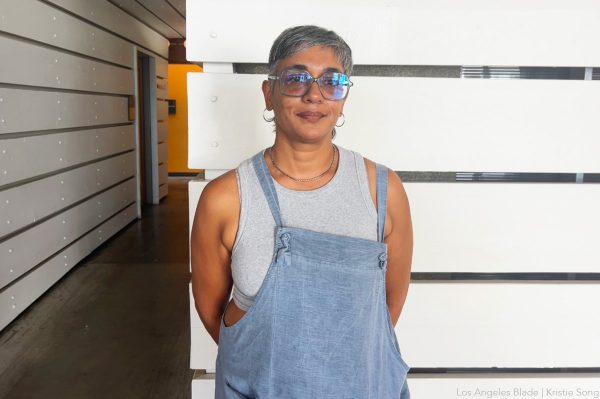
Vikram hopes that — through this exhibition, her lecturing, and her community work — she can “repair” ties between queer adolescents today and queer people of older generations. The knowledge, guidance, and joy she received from relationships she formed with older queer people in her youth provided a model with which she could navigate the world: with fervor and with bravery.
“Now I feel that young people really have very little connection to elder generations — even middle generations like mine. And so that knowledge is not being continuously passed on in the same way,” Vikram said. “This is actually what anthropologists say makes us human: the ability to have that intergenerational transfer of knowledge without having to fight the same battles every generation. And, at this moment in time, that’s being severed because of the fascist turn in our culture, really. So the goal of this project was to help young people who are trying now to organize around a number of issues against this government — for gay rights, for trans rights, for Palestine, for their own health and welfare — to help them get that information in some form.”
“The Sky is Always Falling” opens on Sunday, September 28th with a reception from 4-7 p.m. at the Advocate and Gochis Galleries at the Los Angeles LBGT Center.
Arts & Entertainment
Pride Under the Pines in Idyllwild continues for its 5th year, despite social media backlash
Pride Under the Pines, founded by couple Jeremy Taylor and Niels Kosman, continues on October 4th with live performances, drag, activism, and fellowship

Within Riverside County, in the San Jacinto Mountains, lies the charming community of Idyllwild, known for its beautiful scenery, artistic vibe, and recreational activities. Located just an hour from Palm Springs, it also boasts a growing LGBTQ contingency.
Idyllwild captured the hearts of couple Jeremy Taylor and Niels Kosman, the owners of PS Homeboys, one of Palm Springs’ top interior design and art boutiques. Frequent visitors to Idyllwild, Taylor and Kosman began to wonder why the town never held its own Pride. Taking matters into their own hands and partnering with business owners in the city, Pride Under the Pines debuted on October 23rd, 2021, with over 800 attendees.
Not only was the event a success in terms of LGBTQ representation for the community, but local businesses reported a boom in sales and customers. Pride Under the Pines has since become one of the most anticipated Idyllwild events of the year.
This year, the event celebrates its 5th year with a bang, turning up the glam. The day’s festivities will feature headliners Janice Robinson (“Dreamer”, “There Must Be Love”) and West Hollywood’s Prince Joshua, go-go studs, DJ Galaxy (courtesy of KGay), Congressman Candidate Brandon Riker, and community health partners, with a drag line-up that includes Mayhem Miller, Violeta, and Abigail Beverly Hillz. Los Angeles Blade publisher Alexander Rodriguez will serve as the day’s emcee.
This year continues ahead, full force, despite social media backlash for the event’s signage, hanging smack dab in the center of town. Pride Under the Pines founders Taylor and Kosman are unwavering in their mission to bring queer representation to “The Hill.” They chatted with us as they put the final touches on next week’s programming.
What was the inspiration behind creating Pride Under the Pines?
We wanted to create something truly grassroots and community-driven—a Pride that felt intimate, authentic, and rooted in love. Idyllwild is a magical mountain town that has always embraced diversity, and we thought it was the perfect setting to bring people together in celebration of LGBTQ+ pride, visibility, and joy. We were the first Pride Festival since the pandemic, and it all started when we used Idyllwild as our lockdown escape. We fell in love with the town and its community. Through conversations, we learned there is a large LGBTQ community that also feels the need to be heard and seen. This Pride was started to shine a bright light on the local queer community and to bring awareness to everyone else.
What makes Pride Under the Pines different than other Prides?
Unlike many large-scale city Prides, this event has an intimate, small-town charm. You’re surrounded by nature, pine trees, and a community that genuinely rallies together. It’s not about corporate floats—it’s about neighbors, friends, and allies lifting each other up. That balance of heart, inclusivity, and stunning mountain setting makes it truly one-of-a-kind.
What is your mission in producing Pride Under the Pines?
Our mission is to create a safe, joyful, and visible space where the LGBTQ+ community and our allies can come together. We want to celebrate diversity, promote equality, and strengthen connections in a way that uplifts both the queer community and the town of Idyllwild.
What have been some of your biggest challenges in establishing this event over the years?
Permitting, logistics, and funding have always been challenges for grassroots organizers like us. Each year, we navigate county regulations, rising costs, and unexpected hurdles. And of course, building something from scratch in a small town takes time and persistence. But the love we receive from attendees makes every obstacle worth it.
What have you loved most about working on this project?
The connections. Seeing people who’ve never been to Idyllwild fall in love with the town. Watching LGBTQ+ youth feel seen. Hearing allies say this is their favorite event of the year. And, most of all, the joy of building something meaningful together as a couple, a team, and a community.
What can we expect from this year?
Our 5th anniversary is the biggest yet! A brand-new location at the Idyllwild Town Hall, incredible headliners like Janice Robinson, fabulous drag performances, DJs, live music, a beer garden, delicious food, and a VIP experience with open bar and meet-and-greets. It’s going to feel like a full festival while still keeping that warm community spirit.
Your sign is in the middle of town. Why is it so important to grow visibility in today’s climate?
Visibility saves lives. At a time when LGBTQ+ rights are under attack nationwide, putting a Pride banner in the center of town says: We are here, we are proud, and we are part of this community. It’s a statement of resilience and hope—for queer people in Idyllwild, for visitors, and for anyone driving by who needs to feel seen.
You have received hateful social media comments. How does that make you feel? What is your first reaction?
Of course, it stings—but more than anything, it strengthens our resolve. Hate is loud, but love is louder. Our first reaction is to lean on our allies, our friends, and the outpouring of positivity that always follows.
Did you ever consider cancelling Pride because of hateful comments? What makes you continue to put it on?
Never. If anything, the hate shows exactly why this Pride is needed. We continue because the LGBTQ+ community deserves visibility, joy, and safety in every town—not just the big cities. We continue because love is stronger than hate.
What do you want to say to those who want you to shut down Pride Under the Pines?
We’d say this: Pride isn’t about you. It’s about love, equality, and visibility for people who have historically been silenced. No amount of hate will stop us from celebrating who we are.
On a fun note, how did you two meet, and how long have you been together?
We met years ago in Palm Springs—two creatives who bonded over design, humor, and a shared love for community. We’ve been together for over a decade, and every year just gets better.
You also own and run your business together. How do you maintain a healthy relationship while working so hard together and putting on events?
We laugh. A lot. We balance each other’s strengths and give each other space when needed. We’ve learned how to divide and conquer, but also when to come together. At the end of the day, we love what we do and we love each other—that makes even the hard days easier. We say if you can run a business together and produce a Gay Pride for 5 consecutive years, we must be doing something right.
What do you love most about the queer community in the Coachella Valley?
The diversity and resilience. Our community here is vibrant, creative, and unapologetically itself. Whether in Palm Springs, Idyllwild, or beyond, there’s a sense of family that’s deeply inspiring. We all support each other, whether we patronize each other’s business or we lift each other up through conversation and showing up. It is truly an amazing feeling, that sometimes we feel people forget to remember.
What is your message to the community?
Stand proud, stand visible, and stand together. We need each other more than ever. Come to the mountains, celebrate with us, and remember that Pride isn’t just a party—it’s a powerful act of love, resilience, and community.
The event will be held at Idyllwild Townhall / 25925 Cedar St, Idyllwild-Pine Cove, CA 92549
Cannabis Culture
The LA Blade’s ‘Loud and Proud’ showed the queer history of cannabis in the U.S.
Who knew a little green plant could mean so much to queer liberation?

It’s often forgotten how integral cannabis culture has been to Queer liberation, a little-known aspect of our LGBTQ+ history that August 28th’s Loud and Proud event worked hard to spotlight.
Co-sponsored by the Los Angeles Blade, Culture Machine, and Last Prisoner’s Project, this evening of discussion brought vital knowledge to West Hollywood’s The Abbey. Beyond an invigorating ambience — due largely to stellar performances by Maris and S.I.A.T. — the event was something that most attendees didn’t expect: a call to action. Loud and Proud’s goal was to do more than just inform them about what the marijuana industry looks like in LA. It charted the intricate ways that the advancement of cannabis has been tied to the fight for LGBTQ+ rights. And, by helping fight for its decriminalization, folks can assist thousands of unjustly imprisoned people all across this country.
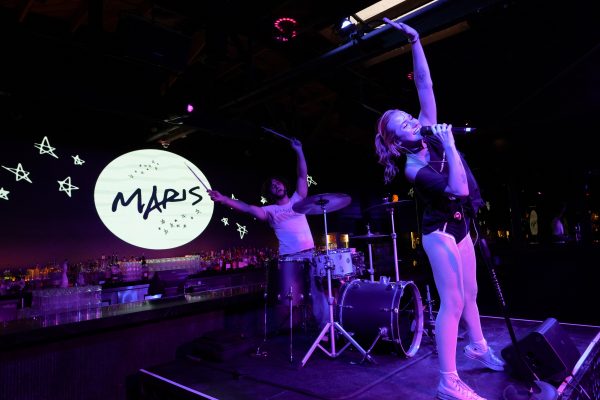
“Our history as queer people is directly tied to the cannabis industry,” explained West Hollywood City Councilman John Erickson, a member of the event’s all-star panel (moderated by LA Blade publisher Alexander Rodriguez). In tandem with fellow cannabis advocates Maha Haq and Andrés Rigal, the speakers explained how not only has marijuana been used globally for centuries, but in the U.S., it was vital in helping survivors during the AIDS crisis. This time saw the earliest instances of weed being used medically, helping those struggling with the nausea of HIV treatment actually want to eat the food their bodies needed to heal. It proved integral in abetting the suffering of countless patients — so what made politicians decide to launch entire media wars against its usage? Along with the corporate greed of billionaires, Erickson clarified exactly why so many lawmakers were scared of queer folk using marijuana: “Cannabis [always broke] through the ‘medical glass ceiling’ — and it was criminalized because you fear the things that you can’t control.”

Loud and Proud attendees were lucky to hear from Steven Post of Last Prisoner’s Project (TLPP), a nonprofit dedicated to freeing the people still incarcerated due to marijuana in the U.S. “This is something that has been going on for over 50 years,” said Post, when breaking down how Ronald Reagan — a President whose discriminatory policies prolonged the lethal AIDS crisis — escalated the “war on drugs” as an excuse to increase policing against Black and Brown communities. He describes how, even though cannabis has not only been legalized in many states but is now a booming industry, there are still thousands of folks in prison for these crimes that are no longer illegal in the U.S. This is a criminalization that has disproportionately targeted queer and Black communities, leaving the populations that revolutionized this drug to suffer while primarily White, cisgender owners profit through their own dispensaries. But though this history is extremely disappointing, Post reminds guests, “There’s a lot of work that still needs to be done….anything you can do, whether it’s sharing a social media post, donating or taking action in your own community, [anything you can do] is really important.” Organizations like TLPP are fighting every single day to free folks imprisoned for cannabis and make it legal for all, a fight that the panelists remind everyone they can join right now.
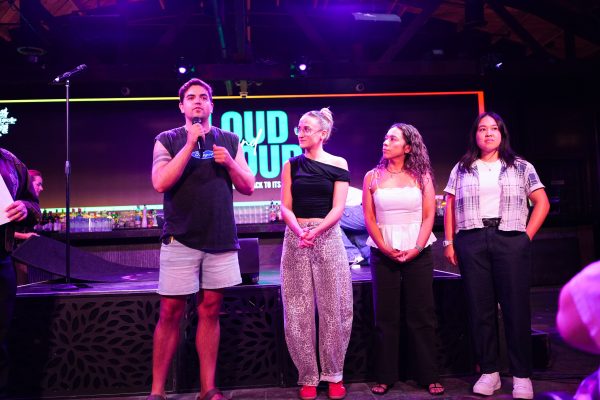
Cannabis has always been utilized not only to help queer folks but give them the wellness tools they need in the ongoing fight for liberation. It’s a usage that isn’t often discussed, but these panelists raise awareness of through their work. “We’re showing consumers that there’s a beautiful, conscious way to understand cannabis,” said Vanessa Oliver, whose company Cloud9 Studios works to inform people about the benefits of cannabis in a wellness-focused, educational way. Along with Luke Anderson, creator of the innovative cannabis company Cann, they emphasize that guests shouldn’t be defeated by the many ways cannabis criminalization is used against their communities. Rather, they should learn from cannabis pioneers like Dennis Peron and Brownie Mary — those who recognized the benefits of this drug and how it could help bring health equity to the communities that so often are denied this human right.
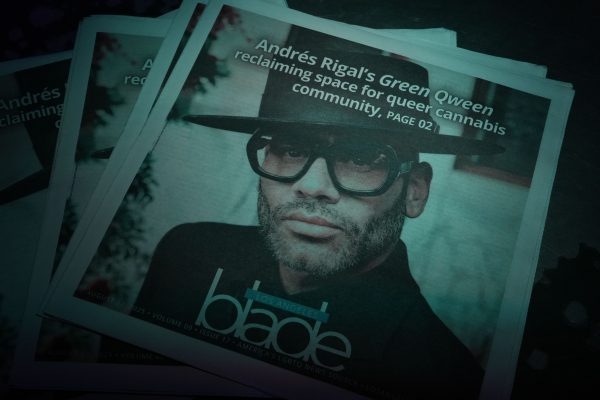
The Loud and Proud panelists made it clear: the fight for queer liberation through cannabis is still alive and strong. Whether it be through nonprofits like The Last Prisoners Project or inclusive business models, these advocates work to free those in prisons and ensure there won’t be any others who face unjust policing due to cannabis. “We’re building off of these stepping stones because we believe this is compassionate care,” clarified Oliver. She and the rest of the panel encourage everyone listening to spread this message, to get involved in the local politics that often determine cannabis laws, and help create a culture where people can benefit from its use safely.
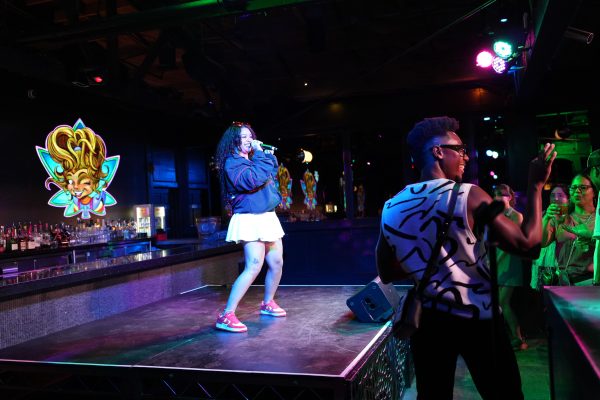
Rousing finale by S.I.A.T. / Photo: Culture Machine
And, most of all, whether it be through community events like Loud and Proud or other ways of community education, to learn about how marijuana usage has always been essential in the fight for queer rights. Because once people understand that, they’ll realize that by fighting to uplift queer Cannabis culture, they’ll be fighting to uplift the entire LGBTQ+ community today.
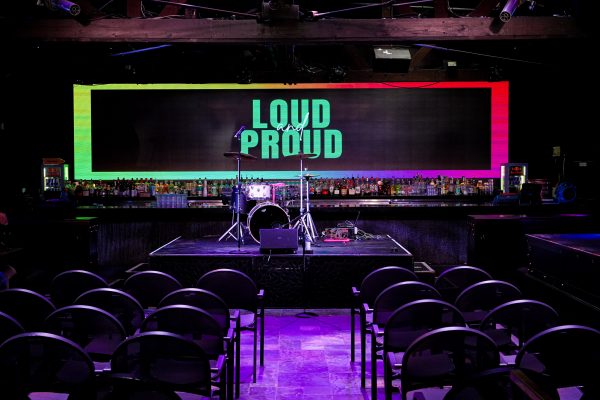
A special thank you to the staff and event team at The Abbey for hosting us, our presenting sponsor, Emerald Village, and contributors TreeXLines and BEBOE.
-

 Arts & Entertainment3 days ago
Arts & Entertainment3 days ago2026 Best of LGBTQ LA Finalist Voting
-

 Health4 days ago
Health4 days agoWhere medicine meets dignity: Be Well Medical Group founder Isaac Berlin is here and queer to serve the community
-

 Out & About4 days ago
Out & About4 days agoQueer, trans AAPI joy shone at this year’s Golden Dragon Parade
-

 Mexico5 days ago
Mexico5 days agoUS Embassy in Mexico issues shelter in place order for Puerto Vallarta
-

 Commentary3 days ago
Commentary3 days agoWhen optics matter more than harm: BAFTA, BBC, and editing solidarity while letting slurs slide on through
-

 California3 days ago
California3 days agoExperts discuss pathways forward as anti-trans violence continues to rise
-

 Autos4 days ago
Autos4 days agoGoing for gold: Ford Bronco Sport vs. Toyota RAV4
-

 a&e features3 days ago
a&e features3 days agoRevry Co-Founder Damian Pelliccione on why we need ‘King of Drag’
-

 Books3 days ago
Books3 days agoNew book profiles LGBTQ+ Ukrainians, documents war experiences
-

 Books2 days ago
Books2 days agoThe social side of self-pleasure: Artist Jason Wimberly presents his newest book of photography, HOMOSOCIAL

